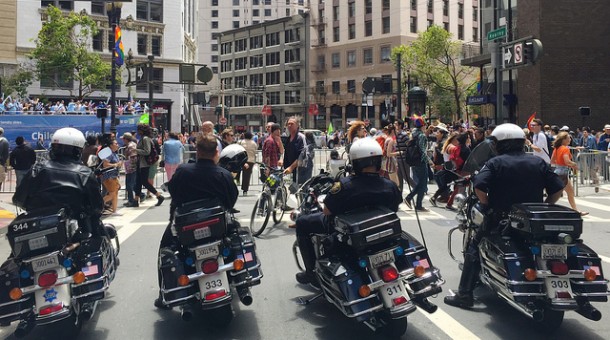Photo: vhines200/Creative Commons
By Candice LeSueur
I excitedly was able to check another thing off my bucket list this last weekend as I flew out to see my friend in San Francisco, a city I have been dying to visit. As she and I were strolling down Valencia Street Friday evening, trying to decide where we wanted to grab dinner, we noticed a riot happening in the middle of the road. There were protesters down the street from us and dozens of police officers on motorcycles gravitating towards them. We chose to steer clear from the event for the sake of our own safety, but I later found out that a Black Lives Matter group had scheduled a “Day of Rage” there near the Mission Police Station. Protesters chanted and shouted at police, who created a blockade with their motorcycles to keep the protesters from moving forward. Officers on foot extinguished the garbage that had been lit on fire by the protesters and made a few arrests. Thankfully, no one was shot or killed on either side.
Being there during that protest has caused me to wonder how much good protests do if no one chooses to listen. So many avoided the scene there in San Francisco because they didn’t want any part of it. Should we be listening? How do we talk to our curious children about what is happening? What do we teach them?
There are many protests happening across the United States. Distraught citizens are desperately wanting to be heard, and for good reason. When reading up on all the cases where innocent citizens have been shot at by police, it is easy to wonder what in the world our police were thinking. This is especially true with recent reports, such as one case in Miami where a man was shot in the leg while he was trying to care for his client with autism. The police persisted to arrest him without addressing the fact that he was injured, though he had done nothing wrong. The officer didn’t care to listen to what he had to say, so there he laid. Confused, and pinned to the pavement.
Of course, most in the line of duty mean well. When a future police officer is in training, they are dreaming of becoming a source for good in their communities. For whatever reason, however, there have been several who have slipped up and have shot and killed the innocent. These cases should not be taken lightly, but we should remember that the vast majority of the police have their heads on straight and do an excellent job at keeping their neighborhoods safe the correct way. To help others learn this, police officers have tried to show their love publicly through demonstrations. Among these, one that I especially loved took place in Rochester, where the Gates Police Department lined up outside Walmart offering free hugs. And there were many takers. When interviewed on the site, Chuck Rapp, a community member who took part in this event, commented, “When I was a kid we knew if we got lost or hurt we could run to the police to get help. A lot of kids these days don’t feel that way so it’s important to show them.”
Though there are efforts on both protesters’ and police officers’ sides, devastating events have still occurred. Cases of police brutality are still in the works, and innocent officers have been killed in ambush shootings, as seen in Dallas last Thursday and Baton Rouge this past Sunday.
Why does all of this matter for our families? What lessons should we be teaching our children from these national crises? The key lesson here is that we need to have respectful dialogue.
I’m sure all of us can recall moments and conversations where we became frustrated because no one was listening or considering what we had to say. Children feel this way with their parents, and vice versa. This is also how many minority groups feel throughout the world. We need to listen to each other and consider the other’s point of view, and then do something. As we choose to invite our children to talk with us and actively listen to their perspectives, we will be helping them recognize the pattern of respectful dialogue.
Dr. Ralph Nichols, who pioneered the study and development of the “field of listening,” wisely counseled, “The most basic of all human needs is the need to understand and be understood. The best way to understand people is to listen to them.”
Fortunately, many really do understand the meaning of this idea and have acted. The Kansas Black Lives Matter group had scheduled a protest to take place this past Sunday. Instead, they had a long discussion with the Wichita Police Department beforehand, where both sides voiced their opinions and listened to each other. After this meeting, the group changed the Sunday protest to a barbecue with police officers and called it the First Steps Cookout. Officers served hamburgers and hot dogs and played basketball with the community. They even danced together! Community members weren’t shy to voice concerns at the event. Officers answered questions and offered to meet with others later.
This is a perfect example of what happens when two sides choose to show compassion and listen to one another. There will always be positive outcomes when this is done with love and empathy.
Is this not what we want our children to learn? If we want our children to grow up learning how to be civil citizens, we need to teach them what it means to truly love others by considering their feelings and having constructive conversations. This will happen if we show them by example.


